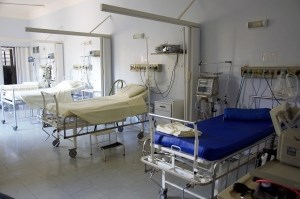B.C. nurses are concerned they might not be able to safely care for their patients should the number of COVID-19 cases in the province rise, according to the president of the B.C. Nurses' Union (BCNU).
“Nurses work every day with infectious diseases, this is part of the work that we’re trained to do,” said Christine Sorensen.
“But this is obviously on an unprecedented scale. So nurses are concerned about their ability to provide safe patient care, particularly if there’s large numbers of patients that will be coming into the acute care system.”
Currently, there are “adequate” supplies and enough personal protective equipment available in acute care facilities, said Sorensen, and the Ministry of Health is working quickly to ensure that long-term care facilities and other sites are also stocked.
But nurses are concerned about supply levels going forward, if the number of COVID-19 cases in hospital increases.
If there’s too many people at one time, said Sorensen, there’s concern over where patients would be housed, and if there would be enough medical and personal safety equipment available to protect nurses, patients and their families.
“If those numbers increase and (COVID-19) persists for a long time,” she said, “we are certainly concerned if we will have enough supply, so it is very important that right now, we utilize our mask supply and our personal protective equipment supply appropriately and conserve supplies for when we need them.”
That’s why it’s so important British Columbians continue to self-isolate, said Sorensen, to help reduce the numbers of people who will get infected at one time and “reduce or stagger the numbers who will come through acute care in Richmond Hospital and need hospitalization,” she said.
“We will struggle if we have too many people, all at one time, so it’s critically important that the public supports the public health measures that are being put in place.”
Richmond Hospital is also fully staffed – a sign of the healthcare system preparing for more coronavirus cases, as the BCNU has raised concerns about nursing levels across the province for some time.
“What we have seen is extraordinary efforts through the healthcare system right now in preparation of this pandemic, and the increased numbers of patients we may be facing, to bring nurses back into the healthcare system,” she said.
This effort includes asking nurses to return from vacation and to work more hours than they might have in the past.
“So that is why, right now in Richmond Hospital, there is no shortage of staff. However, that is not the typical situation. This is big preparation and planning for what we anticipate could happen in the next few weeks,” Sorensen said.
Richmond Hospital has only two entrances, and extra nurses have been deployed to screen every person as they enter the facility, said Sorensen.
The hospital has also been decanting – moving patients out of one area to another to free up needed space – to ensure there’s enough capacity in the facility, said Sorensen, to take in any patients who may have tested positive for COVID-19.
School, daycare cancellations an added pressure
While the provinces haven’t mandated the closure of daycares, some have shuttered due to ill children or because they have more than 50 people in them, said Sorensen, which has raised “significant concerns” for nurses.
The suspension of K – 12 classes is also an added pressure.
“I know that nurses are conflicted and feeling a lot of pressure and are very concerned about both their patients and their families,” she said.
Some nurses may also be working extended hours and need all the help they can get, Sorensen said, urging people to offer their support in any way they can.
“Anything that we can do to support the nurses, such as childcare, even picking up a bag of groceries and dropping it off or a meal prepared that night for when the nurse arrives home,” said Sorensen.
Read more from the Richmond News



